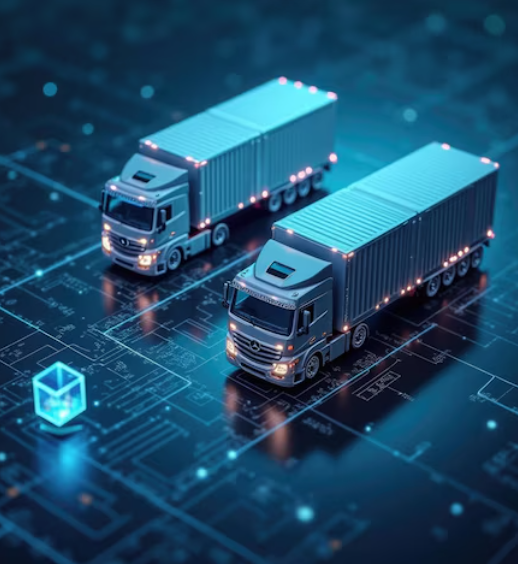As the demands of modern supply chains grow more intricate, the need for systems that offer flexibility, precision, and foresight becomes even more critical. Traditional logistics tools often fall short when it comes to meeting the demands of today’s fast-paced and complex market. This is where AI-driven logistics software steps in, providing an intelligent solution to address the challenges that legacy systems can no longer handle.
In this blog, we’ll delve into the role of artificial intelligence in logistics, its growing importance, and the various ways it is transforming the logistics and supply chain industries.
What Is AI-Driven Logistics Software?
At its core, AI-powered logistics software is a cloud-based platform that integrates artificial intelligence to streamline, automate, predict, and simplify the logistics process from start to finish. These AI tools enhance accuracy in demand forecasting, reduce operational costs by minimizing manual work, and improve the customer experience through tailored interactions.
Unlike traditional systems, AI logistics platforms offer real-time data, predictive analytics, and heightened accuracy to enhance decision-making and operational efficiency. These capabilities enable businesses to respond faster to market changes and optimize their supply chain performance.
The Importance of Predictive Supply Chain Optimization
Managing a supply chain involves coordinating a multitude of moving parts. Traditional logistics platforms often struggle to keep up with this increasing complexity and evolving market risks. AI-powered logistics software integrates seamlessly into every phase of the supply chain, boosting the effectiveness of technologies used throughout the process. Here’s how it helps:
Automating Complex Supply Chains
Manual processes, when not fully automated, can lead to errors and inefficiencies. While traditional systems have reduced manual workloads, they still fail to fully automate critical tasks like demand prediction and dynamic rerouting, which are essential for efficient supply chain management.
AI systems use machine learning to analyze real-time data from complex scenarios, helping businesses make better decisions on things like route optimization, inventory levels, and demand forecasting. The result is reduced errors, more accurate predictions, and a more agile supply chain.
Cost Optimization
Poor visibility into the supply chain pipeline is a major cause of financial losses in logistics. Companies that still rely on outdated systems often struggle when faced with unforeseen events like weather disruptions, supplier delays, or equipment failures. AI-powered systems mitigate these risks by analyzing historical data to provide valuable insights for accurate planning and inventory management, leading to fewer delays and a more stable bottom line.
Improving Inventory Management
Balancing inventory levels is an ongoing challenge. Too much inventory leads to unnecessary storage costs, while too little can result in stockouts and missed sales opportunities. AI logistics software helps by offering precise demand forecasting and intelligent inventory management. By analyzing past order patterns, AI can help warehouse managers optimize storage, ensuring that high-demand items are easily accessible while minimizing the risk of overstocking.
Key Applications of AI in Supply Chain Logistics
AI is revolutionizing logistics in various ways. Here are some core applications:
Demand Forecasting and Inventory Optimization
By collecting and analyzing vast amounts of data, AI-powered logistics systems help businesses gain actionable insights into demand patterns. With accurate forecasting, logistics managers can ensure they meet customer demand without overstocking. This leads to better resource allocation and reduced waste, ultimately improving supply chain performance and boosting customer satisfaction.
Smarter Route Planning
Efficient route planning is critical for on-time delivery and minimizing fuel costs. AI-powered logistics platforms use real-time data on traffic, weather, and other factors to suggest the most efficient routes. Dynamic rerouting capabilities allow businesses to adapt to unforeseen delays, ensuring smoother operations and better customer experiences.
Enhancing Last-Mile Delivery
The final step in the supply chain—the last mile—often plays the biggest role in customer satisfaction. AI-driven logistics tools allow companies to automate customer communications and provide delivery updates in real time. AI-powered chatbots continuously learn from past interactions, helping businesses improve service quality and reduce customer complaints.
Strengthening Supply Chain Resilience
Logistics operations are vulnerable to disruption, whether due to technical failures or security breaches. AI-powered software enhances security by detecting and responding to threats in real-time, helping businesses safeguard sensitive customer data. Additionally, the software can help mitigate human errors by automating routine tasks, reducing the risk of mishaps like shipping incorrect orders or sending goods to the wrong location.
Risk Management and Proactive Decision-Making
In logistics, risks are unavoidable, but AI systems are helping businesses minimize their impact. By continuously analyzing operational data, AI can predict potential disruptions and recommend proactive solutions. This could include identifying process inefficiencies, anticipating delivery delays, or even detecting security vulnerabilities before they become major issues.
Why Choose AI-Driven Logistics?
Platforms like FarEye leverage AI to streamline complex supply chain tasks. With real-time visibility, predictive analytics, and automated workflows, businesses can ensure timely deliveries, optimize resource allocation, and make better decisions on the fly. This not only cuts costs but also improves customer satisfaction, making AI-driven logistics a key differentiator for businesses seeking to gain a competitive edge.
AI logistics systems are also scalable, allowing businesses to easily handle increased order volumes, expand to new regions, or integrate with multiple partners without major infrastructure changes.
The Future of AI in Logistics
The integration of AI into logistics is just the beginning. With advancements in technology like 5G, AI’s capabilities are set to expand even further. The ability to collect and transfer data in real time will open up new opportunities for scaling logistics operations and optimizing workflows.
AI and machine learning are key to creating more agile, resilient, and efficient supply chains. As these technologies continue to evolve, AI-driven logistics will play an increasingly important role in shaping the future of global supply chains, helping businesses improve resource efficiency, reduce costs, and enhance overall performance.


